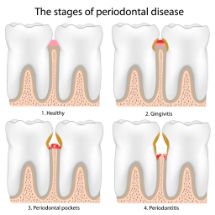 Did you know that an estimated 80% of American adults have some form of gum disease? Also called periodontal disease, this condition has serious implications for your dental health and overall health. And while many people only focus on their teeth, it’s equally important to take good care of your gums as well. Since September is National Gum Care Month, it’s the perfect time to find out more about this common condition, the associated risks, and how gum disease treatment in Denton can help. Learn more below!
Did you know that an estimated 80% of American adults have some form of gum disease? Also called periodontal disease, this condition has serious implications for your dental health and overall health. And while many people only focus on their teeth, it’s equally important to take good care of your gums as well. Since September is National Gum Care Month, it’s the perfect time to find out more about this common condition, the associated risks, and how gum disease treatment in Denton can help. Learn more below!
The Consequences of Gum Disease
Gum disease can be defined as inflammation of the gums and underlying jawbone that keep the teeth in place. As these supportive structures become more and more damaged, the teeth can become loose and fall out. In fact, gum disease is the #1 cause of tooth loss. Unfortunately, however, that’s not the only negative outcome.
In addition, the chronic inflammation of the gums spreads to every part of the body through the bloodstream, and many studies have shown that gum disease increases the risk of:
- Cardiovascular disease
- Pregnancy complications
- Stroke
- Diabetes
- Alzheimer’s disease and other forms of dementia
- Some cancers
Signs and Symptoms of Gum Disease
Although it’s sometimes called a silent disease because you typically don’t “feel” gum disease, there are symptoms to watch for. In the first stage called gingivitis, your gums may bleed (especially after brushing and flossing) or feel tender and swollen.
In later stages, people usually notice more severe bleeding or even pus under the gums, persistent bad breath, a bad taste in their mouth, and loose teeth.
The Importance of Diagnosing and Treating Gum Disease
The first step to achieving healthy gums is having them examined at a checkup. These routine visits automatically include an annual gum evaluation. If a dentist finds that your gums are healthy or you simply have gingivitis, they’ll recommend that you continue getting regular cleanings and practice good oral hygiene at home to keep your gums healthy. This will go a long way towards preventing gum disease altogether.
If a dentist sees signs that you have more advanced stages of periodontal disease in Denton, they’ll typically recommend scaling and root planing (also called a “deep cleaning”) to treat your gums and reduce the inflammation in your body.
This procedure removes tartar and bacteria from under the gumline where it can’t be reached during a regular cleaning. The roots of your teeth will also be smoothed to prevent bacteria from re-accumulating. It’s typically done in 2-4 visits and you’ll be numbed first to make sure you stay comfortable. Then, to maintain your progress, you’ll come back for cleanings every 3, 4, or 6 months. You’ll also get oral hygiene tips to use at home, as good brushing and flossing is crucial to your success.
Your gum health is critical to your well-being. With gum disease treatment and good habits at home, you can maintain great dental and general health well into old age.
About the Author
Dr. Todd Balington is a family dentist in Denton with nearly 15 years of experience and a graduate of Nova Southeastern University College. He’s a firm believer in the importance of healthy gums and focuses on early diagnosis and treatment to help his patients prevent problems as much as possible. If you have any questions or concerns about your gums, he can be reached via his website.
